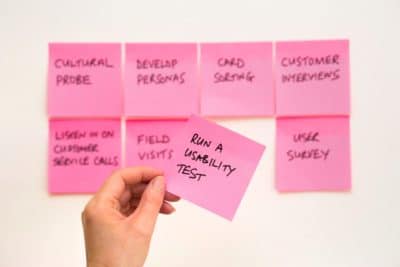When you’ve put in the work in developing software, an application, or a new website, you’ll want to make sure that it works well for the general audience. This is the task of testing, which aims to identify any issues in a user’s flow through your software and improve usability to appeal to the target audience. Here are four tips to employ for usability testing.
IMAGE: UNSPLASH
Test Early And Throughout
The best way to stay on a project’s timeline is by identifying any potential problems as early as possible. This means that testing should happen early. It’s always easier to redesign a part of your software earlier on as opposed to when other parts of the system have been built on top of each other.
Plus, designers can have a sense of how well their efforts are paying off, while users will more readily provide feedback knowing there is still work to do. A usability audit and testing can be conducted in-house or through a company.
Choose Tasks Carefully
Remember that your test users are typically not web developers or QA analysts by trade, so it’s essential to make their tasks simple and easy to understand. You’ll definitely not want to overwhelm your testers, which can skew how they perform the tasks in the first place.
Instead, write out tasks that are one sentence long, free of instruction, and tell a user exactly what you’d like for them to do. In this way, you’ll see how a user naturally moves through your application or software.
Use The Think Aloud Technique
Usability testing involves observing the behavior of a user as they walk through the tasks you’ve set before them. This is beneficial as observation gives you a first-hand look at the navigability of your product. However, a way to go one step further in understanding user interaction is by employing the think aloud technique.
To do so, request that your test users think out loud as they perform each task. This will provide you with more information about a user’s expectations, how they feel in each moment of the user testing, and what they may find confusing.
Find The Right Participants
Your software, application, or website has a target audience, so you’ll do yourself a lot of good to find test users who match the same people who will use the product once it’s complete. If it has not already been done, create detailed personas that will guide your actions both during development and during the testing process.
One rule of thumb is to avoid asking individuals close to the project or to anyone involved in the project to be a test user. This is because these users may have an unintentional bias, which can affect their feedback.
Usability testing is invaluable in design and development because of its ability to provide you with valuable insight that can drive your next steps. With usability testing, you are able to provide a better user experience and, ultimately, gain customer loyalty.
If you are interested in even more technology-related articles and information from us here at Bit Rebels, then we have a lot to choose from.


COMMENTS